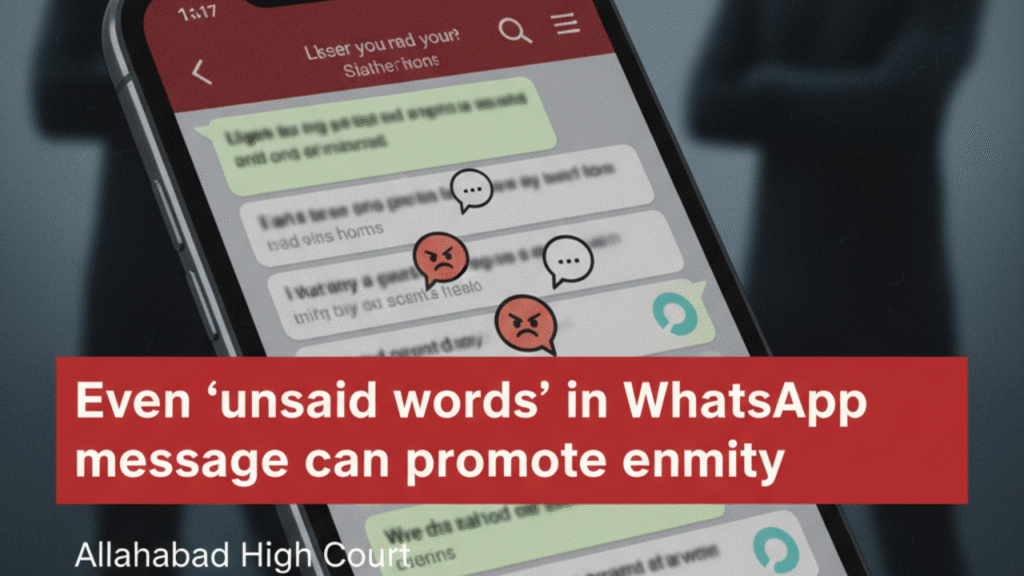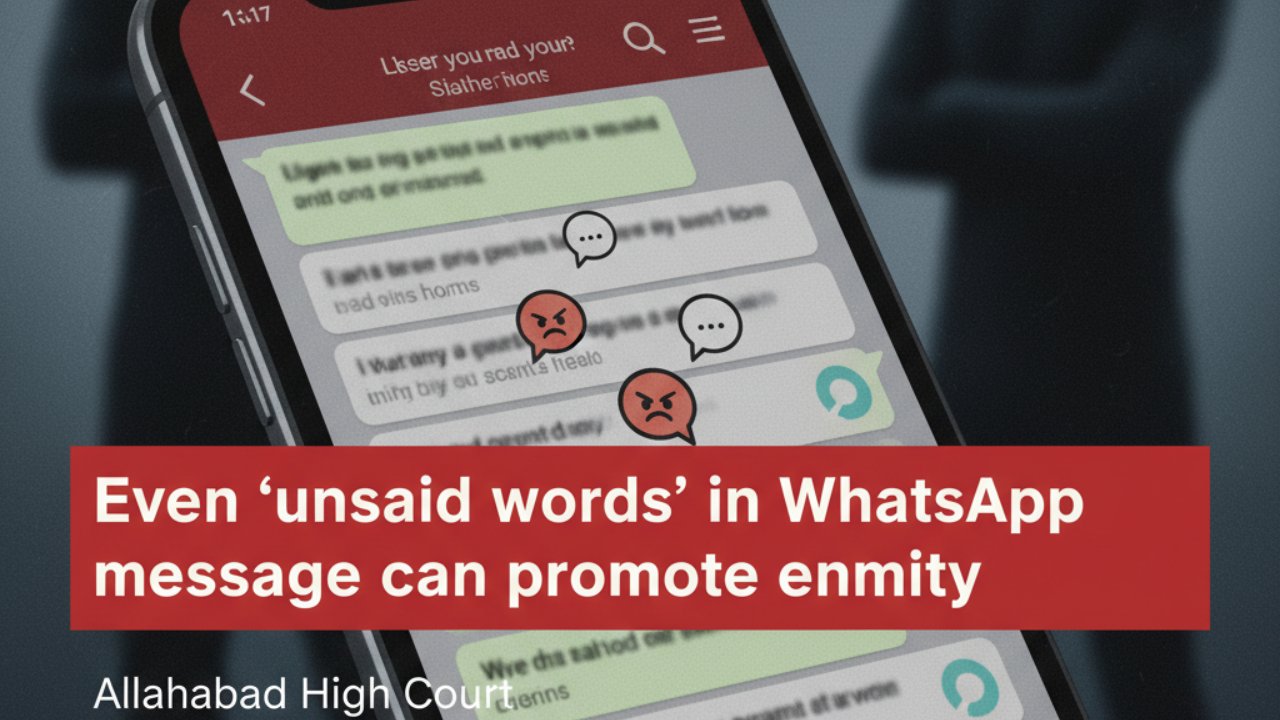In a significant ruling, the Allahabad High Court has said that even “unsaid words” or the subtle undertones of a WhatsApp message can amount to promoting enmity between different religious communities — even if religion is never mentioned directly.
The court made this observation while dismissing a petition filed by Afaq Ahmad, a resident of Bijnor, Uttar Pradesh, who had sought to quash an FIR accusing him of spreading religious hatred through a WhatsApp message.

The Case That Sparked Controversy
A division bench of Justices J J Munir and Pramod Kumar Srivastava delivered the ruling on September 26, stating that the message sent by Afaq, following the arrest of his brother in a religious conversion case, could “outrage religious feelings” and “create ill-will between communities.”
Although Afaq’s message repeatedly expressed his faith in the judiciary, the court found that it carried an implicit message suggesting his brother was being targeted for his religion. According to the judges, such “unsaid words” and indirect messaging could still be considered communal under the law.
The court ruled that the police investigation against Afaq should continue, rejecting his request to cancel the FIR.
A Chain of FIRs
The case dates back to July 19, when Arif Ahmad, Afaq’s brother, was arrested after an FIR was filed by Sandeep Kaushik, an RSS worker. Kaushik accused Arif of public obscenity, breach of peace, and criminal intimidation.
The complaint further alleged that Arif, who ran an electronics and gas-filling shop with his father, had “connections with anti-national and anti-social elements” and was involved in “love jihad.” According to the FIR, Arif was accused of luring Hindu women into relationships, obtaining passports for them under false identities, and taking them abroad to sell them.
Soon after, the charges were expanded to include rape, poisoning, cheating, forgery, and unlawful religious conversion under the Uttar Pradesh Prohibition of Unlawful Conversion of Religion Act, 2021. Arif has remained in jail since his arrest.
Afaq’s Message and the High Court’s View
Following his brother’s arrest, Afaq sent a WhatsApp message to two people, expressing his anguish. The message said his brother had been “framed in a false case under political pressure” and that there was a “call for a total boycott” of his family’s business. He also voiced fears that he could be lynched because of the controversy.
In the same message, Afaq wrote that he trusted the court to “expose the lie.” But while he avoided direct references to religion, the High Court said the “subtle message” suggested that his brother was being persecuted for his faith — a claim that could potentially stir communal tensions.
The judges observed that “the message may not speak per se about religion, but it definitely conveys an underlying and subtle message that his brother has been targeted in a false case because of belonging to a particular religious community.”
Based on this reasoning, the bench concluded that the message “could prima facie outrage the religious feelings of others.”
Police and Court Actions
After Afaq’s message circulated, a police sub-inspector filed an FIR against him on July 30, based on screenshots shared by one of the recipients. The charges related to promoting enmity and disturbing public peace.
More trouble followed: on August 4, Sandeep Kaushik filed another FIR, this time against Afaq’s uncle, Sadik, alleging that he told a local media outlet that Arif had been falsely implicated. Sadik was also accused of promoting enmity under Section 196(2) of the Bharatiya Nyaya Sanhita (BNS).
Then, just last Sunday, Bijnor police registered a second FIR against Afaq himself, under BNS sections dealing with criminal intimidation and breach of peace.
The Defense and the Court’s Rebuttal
Afaq’s lawyer, Syed Shahnawaz Shah, argued that his client’s WhatsApp message was nothing more than an emotional response to his brother’s arrest and reflected personal anguish, not communal provocation.
However, the High Court disagreed, saying that the message’s “unsaid words” carried an implicit communal tone that went beyond personal expression. The judges maintained that it was not just the explicit content of a message that matters — the context, tone, and implications also count.
The Backstory Behind the Dispute
Speaking to The Indian Express earlier this month, Afaq said his brother Arif had begun a relationship with a Hindu woman in July 2020, and he had urged him to marry within their community. Arif eventually married someone from their own faith in 2023 and had a daughter.
Afaq said he believed the matter was settled until he received a call from local residents in July 2025, asking him to attend a community meeting. There, he was told that Arif had tried to convert a Hindu woman and planned to take her to Dubai — allegations that eventually led to the FIR and arrest.
Kaushik, the complainant, told The Indian Express that he filed the case because the woman’s family was “scared,” and he acted “as a responsible member of society.”
What the Ruling Means
The Allahabad High Court’s ruling highlights how digital communication — even indirect or subtle messages — can have legal consequences if they are perceived as promoting enmity or communal disharmony.
The judgment also reflects a growing judicial emphasis on the tone and intent behind social media messages, not just their literal content.
In a world where WhatsApp messages can travel fast and reach hundreds within seconds, the court’s observation sends a clear signal: sometimes, what’s left unsaid can be just as powerful — and just as punishable — as what is said outright.






